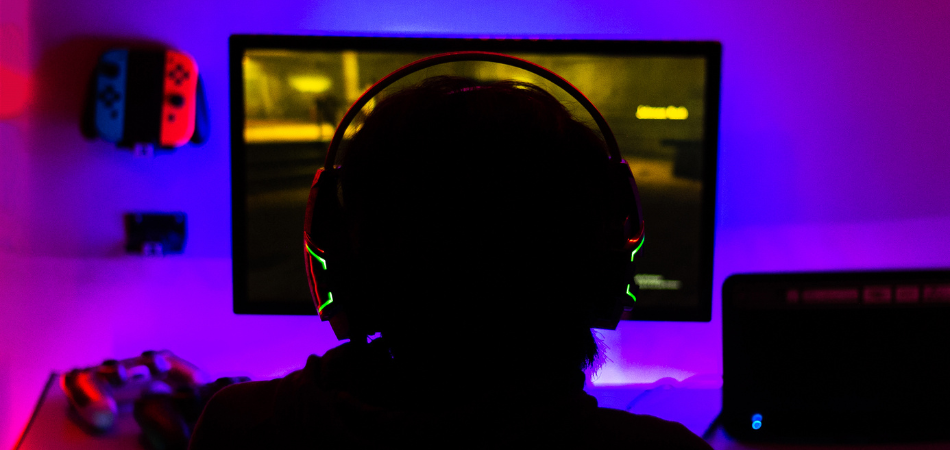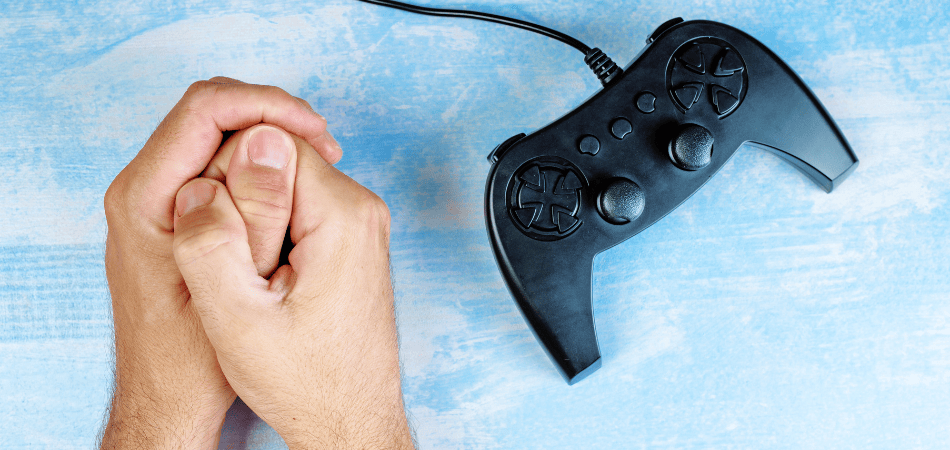
Written by:

Medically Reviewed by:
Last Updated:
January 6th, 2025
Gaming Addiction | Signs, Effects & Treatment
Video gaming is a common activity for both children and adults. Some people manage to engage moderately and balance video gaming with other activities. It is estimated that there are nearly 45 million gamers in the UK, which is around two-thirds of the total population. This condition can include playing video games on the internet or any other electronic device. However, most people who experience serious gaming problems use the internet.
For some people, this activity turns into a damaging past-time, and they cannot maintain a healthy relationship with it. Like most things, too much gaming can result in significant problems.
Researchers have varied opinions about whether internet and gaming addiction should be considered an addiction or a mental disease. Many experts believe gaming addiction is a form of behavioural addiction, similar to gambling addiction, where the thrill of winning becomes one of the primary motivations.
Children, teenagers, and adults can all develop a gaming addiction, though it is more common in the latter. Furthermore, men are more prone to gaming addiction than women. If you are concerned about your gaming or think someone in your life could have an addiction to video games, read on for valuable information and support.
What Is gaming addiction?
Gaming addiction is a disorder characterised by people struggling to control their gaming activity. This lack of control can interfere with self-care, school or work responsibilities and personal hygiene. Video gaming can include any device, such as PlayStations and Xbox, but most commonly, it involves mobile or internet gaming.
Gaming disorder shares similarities with other addictive behaviours, such as gambling. People with this condition are likely to prioritise playing over other activities, which can significantly affect their health and well-being. The World Health Organisation criteria state that somebody who has experienced negative social, educational or work impacts for at least 12 months could be living with a gaming addiction.
Addiction of any kind deteriorates a person’s mental, social and physical health. If you are concerned that you may be living with a video gaming addiction or somebody in your life is struggling, seek help from trusted mental health experts.
Are there different types of gaming addictions?
There are two main forms of video games, and it is common for individuals to be addicted to one of these types of games. The first form is individual-player games, these types of games are generally mission-related, and people often get addicted to the satisfaction of completing goals or beating previous scores. Unfortunately, the ‘high’ of completing a game doesn’t last long, and it is common to feel depleted or empty after finishing a game.
The second form of a video game is multiplayer. These games are usually played online with several other people, both friends and strangers. Multiplayer games don’t have such a typical journey which has to be completed, which can lead to them being particularly addictive. The addictive nature of multiplayer games tends to come from their competitive nature, with constantly changing rankings to keep up with. Playing games online can provide people with a sense of community and acceptance, which they may struggle to find outside gaming. This can make it particularly hard to reduce time spent online.
Despite the distinction in these games, dependency on them generally manifests in similar ways.
How does a gaming addiction develop?
Video gaming is a relatively new activity, with the oldest games originating around half a century ago; this means understanding the actual effects is complex. Research is growing in this area, and the World Health Organisation included ‘gaming disorder’ in their medical references in 2018.
There is not a single cause for a gaming addiction to develop; several factors tend to lead to addictive behaviour. Unfortunately, video games are designed to encourage people to play them more and more. Video game designers often use complex psychology to enable users to continue playing and increase their usage. Often, video games are designed to have the right components that keep you playing without giving up. This addictive element of gaming is often compared to gambling disorders.
Some other common components of gaming which contribute to addiction include:
Winning
Almost all video games have an element of winning or achieving a high score. This keeps players hooked, whether they are ‘beating’ their score or somebody else’s. Video games which involve multiple players are often designed to encourage a ‘battle nature’, where the goal is to beat the other team players. Another form of winning can be seen in beating or overcoming the game; many players will be enticed by defeating the entire game.
Role-play
Some games have an element of role-play, where the player creates characters and embodies them. This can create a sense of attachment that becomes hard to let go of. For many people, becoming characters through the screen gives them a sense of freedom and confidence that they may otherwise not have.
Excitement
Video games are designed to be exciting and keep people hooked as they are often more visually stimulating than the world outside of gaming. This sense of adventure and discovery can provide a distraction for people who are struggling in other aspects of life.
Contact
Online games, in particular, offer a chance to make connections and friendships with other gamers. Some people may find socialising extremely difficult, so their gaming community provides them with a much-needed sense of belonging. Individuals who struggle with identity or bullying are especially likely to be drawn to the online community where they can be accepted without fear of judgement.
This combination of factors can make gaming addictions extremely powerful. Working with a skilled therapist can help individuals to address underlying issues which may be contributing, such as mood disorders, anxiety or low self-esteem.
Common symptoms of a gaming addiction
Identifying a gaming addiction is not always easy, given that such a large number of people engage in these games, and many manage without any issues. There are some signs to look out for which can indicate a problem; these can be both psychological and physical. Below we look at some of these indicators.
Psychological signs
- Restlessness or frustration if denied gaming
- Constant thoughts of gaming
- Playing in secret or being dishonest about playing activity
- Withdrawing from others to play
- A loss of enjoyment in things previously enjoyed
Physical signs
- Tiredness
- Headaches
- Hand, neck or back pain
- Neglecting personal hygiene
Short-term impacts of gaming addiction
Like other addictions, video gaming can have short- and long-term impacts on the individual. Some of the short-term implications can lead to serious long-term issues if they are addressed. Initially, people may have problems such as tiredness or hunger as they choose to game over addressing their personal needs. Additionally, they may have pale or sunken skin due to a lack of sunlight and vitamin D.
Long-term impacts of gaming addiction
In the long term, an addiction to video games can result in malnutrition or insomnia due to disrupted functioning. Additionally, they may experience loneliness or isolation, which, in turn, can lead to significant mental health issues.
Furthermore, some gamers may need to pay more attention to other responsibilities, such as work or school, which can result in lowered educational attainment, unemployment or money problems.
Diagnosing gaming addiction
Diagnosing a gaming addiction usually starts with the individual, or someone around them, acknowledging the symptoms associated with the disorder. This is not an easy process, as there is often a significant emotional attachment to playing, but the good news is there is support available. If the above symptoms resonate with you, or you are concerned about a loved one’s gaming, get in touch with us at Linwood House to discuss your recovery options.
Getting over gaming addiction
The best way to recover from a video gaming addiction is by accessing a treatment programme which specialises in gaming addiction. Therapists will address your condition’s root causes and help you find alternative coping mechanisms.
Cognitive behavioural therapy (CBT) is one of the most effective forms of treatment for gaming addiction. It can be used to change negative thought processes into more positive, healthy thinking patterns.
Some people may benefit from a residential stay to detox from gaming, allowing them to focus on the psychological aspects of addiction.


